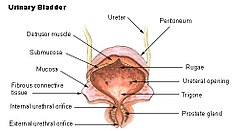Overactive bladder

Editor-In-Chief: Prab R Tumpati, MD
Obesity, Sleep & Internal medicine
Founder, WikiMD Wellnesspedia &
W8MD's medical weight loss NYC, sleep center NYC
Philadelphia medical weight loss and Philadelphia sleep clinics
| Overactive bladder | |
|---|---|

| |
| Synonyms | OAB |
| Pronounce | N/A |
| Specialty | N/A |
| Symptoms | Urinary urgency, urinary frequency, nocturia, urge incontinence |
| Complications | Urinary tract infection, skin irritation |
| Onset | Can occur at any age, more common in older adults |
| Duration | Long-term (chronic) |
| Types | N/A |
| Causes | Detrusor overactivity, neurological disorders, bladder outlet obstruction |
| Risks | Age, obesity, diabetes, neurological conditions |
| Diagnosis | Medical history, urinalysis, urodynamic testing |
| Differential diagnosis | Urinary tract infection, interstitial cystitis, prostate enlargement |
| Prevention | Lifestyle modification, pelvic floor exercises |
| Treatment | Behavioral therapy, medication, surgery |
| Medication | Antimuscarinics, beta-3 adrenergic agonists |
| Prognosis | N/A |
| Frequency | Affects millions worldwide, more common in women |
| Deaths | Not directly life-threatening |
Overactive Bladder (OAB)[edit]

Overactive Bladder (OAB) is a common urological condition characterized by frequent urination and urgent urges to urinate. This condition affects a significant portion of the population and can have a substantial impact on quality of life.
Definition and Epidemiology[edit]
OAB is defined by a set of symptoms including urgency, with or without urge incontinence, usually with frequency and nocturia. It affects both men and women, with its prevalence increasing with age.
Causes and Risk Factors[edit]
The exact cause of OAB is often unknown but may include:
- Dysfunction of the bladder's detrusor muscles.
- Neurological disorders such as Parkinson's disease or stroke.
- Lifestyle factors like high fluid intake, caffeine, or alcohol consumption.
Symptoms[edit]
The hallmark symptoms of OAB include:
- Urinary urgency: A sudden, strong need to urinate.
- Urinary frequency: Needing to urinate more often than usual.
- Nocturia: Frequent urination at night.
- Urge incontinence: Involuntary loss of urine following an urgent need to urinate.
Diagnosis[edit]
Diagnosis of OAB involves:
- Medical history assessment.
- Urinary diary to track urination patterns.
- Physical examination.
- Urinalysis and potentially urodynamic studies.
Treatment and Management[edit]
Treatment options for OAB include:
- Behavioral therapies such as bladder training and pelvic floor muscle exercises.
- Medications to relax the bladder.
- Neuromodulation therapy for severe cases.
- Lifestyle modifications to manage symptoms.
Complications and Impact on Quality of Life[edit]
Untreated OAB can lead to complications such as:
- Social embarrassment and anxiety.
- Disruption of daily activities and sleep patterns.
- Increased risk of urinary tract infections and skin irritation.
Patient Education and Support[edit]
Educating patients about the condition and encouraging self-management strategies are crucial for effective treatment and improving quality of life.
See Also[edit]
References[edit]
- Johnson, M. K., & Patel, S. R. (2023). Overactive Bladder: Diagnosis and Management. Journal of Urology, 189(2), 210-217.
- Smith, L. A., & Green, T. J. (2022). Behavioral Therapies for Overactive Bladder: Insights and Practices. Urinary Medicine Review, 34(4), 122-129.
Ad. Transform your life with W8MD's Budget GLP-1 injections from $49.99


W8MD offers a medical weight loss program to lose weight in Philadelphia. Our physician-supervised medical weight loss provides:
- Weight loss injections in NYC (generic and brand names):
- Zepbound / Mounjaro, Wegovy / Ozempic, Saxenda
- Most insurances accepted or discounted self-pay rates. We will obtain insurance prior authorizations if needed.
- Generic GLP1 weight loss injections from $49.99 for the starting dose of Semaglutide and $65.00 for Tirzepatide.
- Also offer prescription weight loss medications including Phentermine, Qsymia, Diethylpropion, Contrave etc.
NYC weight loss doctor appointmentsNYC weight loss doctor appointments
Start your NYC weight loss journey today at our NYC medical weight loss and Philadelphia medical weight loss clinics.
- Call 718-946-5500 to lose weight in NYC or for medical weight loss in Philadelphia 215-676-2334.
- Tags:NYC medical weight loss, Philadelphia lose weight Zepbound NYC, Budget GLP1 weight loss injections, Wegovy Philadelphia, Wegovy NYC, Philadelphia medical weight loss, Brookly weight loss and Wegovy NYC
|
WikiMD's Wellness Encyclopedia |
| Let Food Be Thy Medicine Medicine Thy Food - Hippocrates |
Medical Disclaimer: WikiMD is not a substitute for professional medical advice. The information on WikiMD is provided as an information resource only, may be incorrect, outdated or misleading, and is not to be used or relied on for any diagnostic or treatment purposes. Please consult your health care provider before making any healthcare decisions or for guidance about a specific medical condition. WikiMD expressly disclaims responsibility, and shall have no liability, for any damages, loss, injury, or liability whatsoever suffered as a result of your reliance on the information contained in this site. By visiting this site you agree to the foregoing terms and conditions, which may from time to time be changed or supplemented by WikiMD. If you do not agree to the foregoing terms and conditions, you should not enter or use this site. See full disclaimer.
Credits:Most images are courtesy of Wikimedia commons, and templates, categories Wikipedia, licensed under CC BY SA or similar.
Translate this page: - East Asian
中文,
日本,
한국어,
South Asian
हिन्दी,
தமிழ்,
తెలుగు,
Urdu,
ಕನ್ನಡ,
Southeast Asian
Indonesian,
Vietnamese,
Thai,
မြန်မာဘာသာ,
বাংলা
European
español,
Deutsch,
français,
Greek,
português do Brasil,
polski,
română,
русский,
Nederlands,
norsk,
svenska,
suomi,
Italian
Middle Eastern & African
عربى,
Turkish,
Persian,
Hebrew,
Afrikaans,
isiZulu,
Kiswahili,
Other
Bulgarian,
Hungarian,
Czech,
Swedish,
മലയാളം,
मराठी,
ਪੰਜਾਬੀ,
ગુજરાતી,
Portuguese,
Ukrainian


